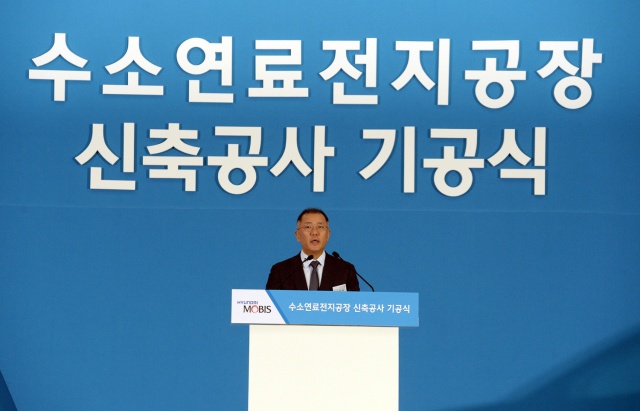What's the news?
Amid all the talk of batteries and electric cars, Hyundai has announced a commitment to a hydrogen fuel cell future. By 2030, the Korean giant has said that it wants to be building 700,000 hydrogen fuel cell powerplants per year, and it has just broken ground on a new factory to help it achieve that aim.
Now, note that we say powerplants, and not cars. Hyundai isn't just talking about building fuel-cell powered cars, but is also ambitious to supply fuel cell tech to other transport sectors, such as drones, vessels, rolling stocks and forklifts. It's even open to sharing its fuel cell tech with other car makers. The plan is to produce around 500,000 fuel cell cars by that time, and Hyundai estimates that there will be a global demand for around 2 million hydrogen vehicles a year in 2030.
"Hyundai Motor Group, the global pioneer of the commercial production of FCEV, is taking a bold step forward to expedite the realization of a hydrogen society,'' said Euisun Chung, Executive Vice Chairman of Hyundai Motor Group. "We will expand our role beyond the automotive transportation sector and play a pivotal role in global society's transition to clean energy by helping make hydrogen an economically viable energy source. We are confident that hydrogen power will transcend the transportation sector and become a leading global economic success."
The announcement kicks off a €6 billion investment in hydrogen R&D, part of which is that commitment to build a new fuel cell factory in Chungju, South Korea. That work is being carried out by Hyundai's fuel-cell specialist subsidiary, Hyundai Mobis.
Hyundai is also prepping to launch its new Nexo fuel-cell powered SUV, which it says is built on its first dedicated fuel-cell vehicle chassis. The previous Hyundai fuel cell car was based on the old ix35 SUV, and was sold and leased in strictly limited numbers.
While hydrogen power has generally taken a back seat to battery tech in the past few years, it seems that a H2 revolution is far from out of the question. The influential financial analysis firm McKinsey & Company has said that, by 2030, it sees global demand for as many as 6.5 million fuel cell systems. Again, not all of those will be in passenger cars, but Hyundai is certainly betting that the future isn't all about batteries.




